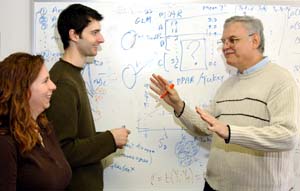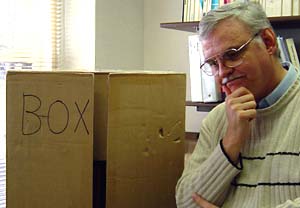Gesturing as if turning sections of a large object over his head, Michael A. Province, Ph.D., tries to communicate the scope of his research field. “It’s like we’re all manipulating different parts of a huge, multidimensional Rubik’s cube,” he says.

By “we,” Province means the worldwide community of geneticists, biostatisticians, physicians and molecular biologists who seek medical solutions hidden within raw genetic data.
“We’re making progress, but the puzzle has turned out to be much more complex than most researchers had predicted,” he says.
For his role in solving the genetic Rubik’s cube, Province, professor of biostatistics and genetics in the Division of Biostatistics, creates powerful mathematical models to sort out the patterns and relationships inherent in genetic studies. The statistical models can home in on chromosome regions likely to contain genes affecting health, disease and response to medications and other environmental factors.
Province’s specialties are population genetics and genetic epidemiology. The genetic studies in which he participates investigate populations and track characteristics through families or racial and ethnic groups.
By studying inheritance patterns of genes and traits in populations and factoring in demographic information or biological and environmental influences, biostatisticians like Province can identify potential risk factors for disease and help determine ways of prevention.
An innovative thinker
“Back in the early ’80s or late ’70s, prominent geneticists went out on a limb asserting that the big diseases like heart disease, cancer and Alzheimer’s are determined by three or four genes,” Province says. “They proclaimed that within 20 years, we would find the genetic causes for disease after disease.”
Unfortunately, such optimism proved unfounded. The genetic and environmental influences that contribute to most widespread, chronic diseases proved far more complex than thought and remain largely unknown.
Still, for Province, this brings a degree of challenge that keeps things interesting.
“I like being in a field that is so wide open for discovery,” he says. “We’re looking for what accounts for why we are the way we are.
“That can be how fat you are, how smart you are, how depressed you are. No one knows right now how or who or when, but I believe that some day the puzzle will be solved.”
Collaborator Howard L. McLeod, Pharm.D., associate professor of medicine, of genetics and of molecular biology and pharmacology calls Province “a model of the modern faculty member. He’s not afraid to work with people that think outside the box.”
Longtime colleague Ingrid B. Borecki, Ph.D., associate professor of biostatistics and genetics, agrees that Province is a very innovative thinker — always coming up with fresh ways of looking at things and solving problems effortlessly.
“Mike once developed a model for genetic analysis using what we call path analysis,” she says.
“Then he realized there might be innumerable ways to alter the model for specific applications. But instead of writing different programs for all the different cases, he just wrote a program that writes programs based on the model a researcher would like to use.”
A groundbreaking biostatistician
Province earned a doctoral degree in mathematics from Washington University and has been on the faculty of the biostatistics division since he finished his dissertation in 1987.
During that time, he has witnessed the rapid advancement of computer technology, which has fortuitously paralleled the exponential growth of genetic data from genome sequencing and large-scale population studies.
At the same time, new statistical methods — several of which Province has created — have been developed.
“It’s a real challenge to understand how the complex pathways that underlie states of health and disease dynamically interact to produce a final outcome,” Province says.
“Statistics has grown along with the information to try to make sense of it. Plus, with the help of computers, we are able to perform statistical analyses that would have been impossible even 10 years ago.”
When Province started at the University in the late 1980s, both the computing tools and the math tools “were very crude.”
Back then, he remembers staying late into the evening feeding punch cards into a card reader. “With the computer programs we were coding, we were thrilled to be estimating 10 parameters in a matter of days or even weeks,” he says. “Now we input hundreds of parameters and it takes just a few minutes to run the program. It’s no big deal.”
A multitasking expert
Province serves as principal investigator or co-principal investigator on several genetic studies conducted in multiple centers across the world, a fact that keeps him traveling frequently to ensure connections are maintained.

The division, and Province’s lab especially, often serves as the data coordinating center for these studies.
“We’re the traffic cops, directing how the data gets put together,” Province says. “Then, of course, we also take a big responsibility in analysis of the data.”
Province’s projects include studies of longevity, hypertension, heart disease and obesity as well as response to exercise.
A recent collaborative project with McLeod, also the core director of pharmacology at the Siteman Cancer Center, looks for genes that govern whether chemotherapeutic medications will be effective.
“Identifying these genes will allow physicians to choose the drug that is apt to work best for each individual,” Province says.
The project tests varying doses of chemotherapeutic drugs on cell cultures derived from the white blood cells of volunteers. Because chemotherapeutics are toxic by design, cell death in these cultures is a measure of drug effectiveness.
The cells used in the study came from volunteers who were members of large families and the familial relationship of the donors allows the researchers to trace genes through pedigrees and find gene sequences responsible for dose responses.
“Our current understanding of drug therapy is based on our current impression, rather than objective, genome-wide analysis,” McLeod says.
“The statistical approach that Mike and his team bring to this project has allowed us to go beyond the standard one-gene, one-effect model and let the biology tell us which genes are really of importance.”
An innate comedian
Province has built an interesting reputation among his colleagues.
|
Michael A. Province Below is an excerpt from a humorous “study” Province developed to test mathematical techniques. Province had to design a simulated dataset for a large group of pharmacogeneticists. But instead of labeling the variables X and Y he conjured up a disease condition — called tenureitus — to make things more interesting. Tenureitus is a disease characterized by an obsessive drive for job security. It’s estimated that it’s responsible for more than 99.44 percent of the pollution of prestigious scientific journals with useless, red-herring publications, costing billions for postdocs to debunk. Treatment options are limited but include isolation, massive doses of alcohol and lobotomy. Anecdotal success has been reported with electroshock and/or assignment of administrative duties. |
They know him as an excellent leader, a brilliant strategist — and a darned good comedian.
In fact, the biostatistics division annually calls on him to produce a comedy routine for the holiday party.
“It started one year almost accidentally with a silly Christmas poem,” Province says. “People liked it and every year since, I’ve been trying to outdo what happened the year before.”
Borecki says the staff really looks forward to the Christmas party ever year to see what he’ll come up with.
“He can be a little edgy and irreverent,” she says. “I think he could have had an alternate career as a comedy writer or stand-up comic.”
D.C. Rao, Ph.D., director of the Division of Biostatistics and professor of biostatistics, of genetics and of psychiatry, concurs.
“I think Mike Province could run a late night show like David Letterman’s,” he says. “He’s got a knack for humor and at the same time he is also an unusually creative mathematician.”
Maybe because of his innate sense of humor, Province takes his multiple projects and busy schedule in stride.
And when faced with a new, intricate and ambitious statistical project, his response is: “Sure it’s a huge task, but it’ll be a lot of fun.”